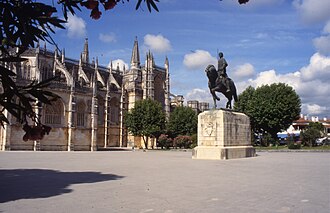Nuno Álvares Pereira
Nuno Álvares Pereira (also known as Saint Nuno de Santa Maria ) (born June 24, 1360 in Cernache do Bonjardim , Portugal ; † November 1, 1431 in Lisbon ) was a Portuguese military leader . As the son of prior Álvaro Gonçalves Pereira and his wife Iria Gonçalves do Carvalhal, he came from a noble family and embarked on a military career. At the age of 23 he was given supreme command of the Portuguese armed forces. Thanks to his strategic genius, he played a decisive role in defending against the Castilian claims on young Portugal and in the rise of the House of Avis. In 1423, after the death of his wife, he retired from public life as a Carmelite monk . In 2009 he was canonized by the Catholic Church .
history

After the revolution of 1383 , Portugal found itself in a difficult dispute with the neighboring kingdom of Castile . In Portugal, King Ferdinand I, the last ruler of the Burgundian dynasty, died without a male heir. Via Ferdinand's daughter, who was married to King John I of Castile, Portugal should actually have inherited the Castilian crown. The Portuguese people revolted against this. Johann von Avis , an illegitimate half-brother of Ferdinand, took the lead in the uprising. When Castile invaded Portugal with a large force, the Cortes , the Portuguese aristocratic parliament, declared him the “defender of the fatherland”. Nuno Álvares Pereira stood loyally on the side of Johann von Avis as a military leader. He is described as just as pious as a gifted strategist and tactician. The decision was reached in 1385 when the Castilian and Portuguese armies met at the Battle of Aljubarrota . The Castilians outnumbered the Portuguese and were better armed. Despite this, the Portuguese managed to achieve an overwhelming victory, which is particularly attributed to the strategic genius of Nuno Álvares Pereira.
With this victory, the Castilian claims to Portugal were permanently fended off. John of Avis was proclaimed king by the Cortes as John I of Portugal and thus founded the second Portuguese dynasty, the House of Avis . Nuno Álvares Pereira became a national hero, the grateful king showered him with honors and material possessions. After the marriage of Nuno's heir, Beatriz, to Alfons of Braganza , the illegitimate son of John I, this property later largely fell to the Braganza family and formed the basis for the family's rise to become the most important noble family in Portugal. Thus, he can be considered the founder of the House of Braganza, which ascended the Portuguese throne in 1640.
Following a vow, Nuno Álvares Pereira founded the Carmelite monastery Convento do Carmo (Lisbon) , the ruins of which are now a sight of the Portuguese capital. Only at the age of 62, after the death of his wife, did he enter the monastery he had founded, where he performed the lowest services at his own request and henceforth called himself Nuno de Santa Maria .
At the center of his spirituality was a particularly deep devotion to the Virgin and Mother of God, Mary. When Nuno Álvares Pereira died in 1431 in the name of holiness, the entire royal court attended his funeral ceremony. He was buried in the monastery he founded. Soon after his death, a brisk stream of pilgrims began to come to his grave, where people appealed to his intercession in their needs. Numerous songs were written that extolled the virtues of the "Santo Condestável " (Holy Marshal).
Because of his great piety, Nuno Álvares Pereira was beatified by the Catholic Church in 1918 . On April 26, 2009 Nuno Álvares Pereira was by Pope Benedict XVI. canonized . In Portugal, his feast day is celebrated on November 6th.
Offspring
His wife Leonor de Alvim gave birth to a daughter named Beatriz, who married the first Duke of Bragança, Afonso de Portugal.
Aftermath
In Portugal's national epic , The Lusiads , Luís de Camões names Nuno Álvares Pereira 14 times as Saint Nuno .
The German writer Reinhold Schneider created a literary monument for Nuno Álvares Pereira in his novel The Silver Ampel (Cologne-Olten 1956).
The oldest mission school in what is now East Timor is the Colégio Nuno Álvares Pereira in Soibada .
literature
- Cordeiro, Valério Aleixo: Vida do Beato Nuno Alvarez Pereira. 2. edição, Livraria Catholica, Lisboa 1921.
Web links
Individual evidence
- ↑ http://www.traditioninaction.org/SOD/j045sdNuno11-6.htm
- ↑ Timor-Leste / Biografia do Presidente Nicolau dos Reis Lobato , accessed on December 31, 2012; in English: Biography of President Nicolau dos Reis Lobato , accessed November 2, 2012
| personal data | |
|---|---|
| SURNAME | Pereira, Nuno Álvares |
| ALTERNATIVE NAMES | Saint Nuno de Santa Maria |
| BRIEF DESCRIPTION | Portuguese military leader and Carmelite, lay brother and blessed |
| DATE OF BIRTH | June 24, 1360 |
| PLACE OF BIRTH | Cernache do Bonjardim , Portugal |
| DATE OF DEATH | November 1, 1431 |
| Place of death | Lisbon |

